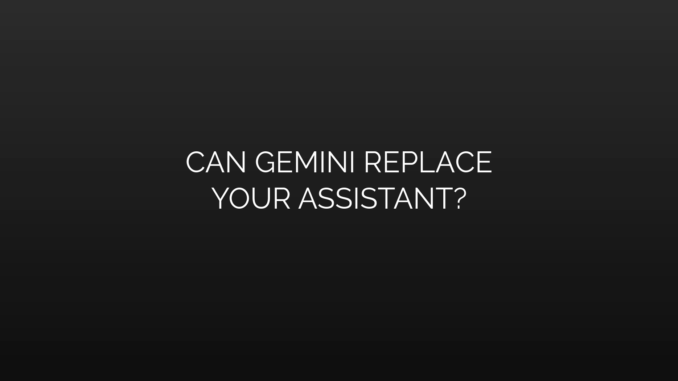
Can Gemini Replace Your Assistant?
The rapid advancement of artificial intelligence has reshaped countless industries, and administrative support is no exception. Google’s Gemini—an advanced AI assistant—promises to streamline workflows, spark creativity, and reduce operational costs. But can it truly replace a human assistant? This article examines Gemini’s capabilities, limitations, and practical applications to help you decide whether it’s a viable alternative to traditional support staff.
What Gemini Brings to the Table Gemini leverages generative AI to handle a vast array of tasks. Unlike conventional software, it contextualizes complex requests and generates dynamic outputs like emails, reports, or code snippets. Key strengths include:
- Rapid Information Synthesis: Gemini scans documents, databases, and web sources in seconds, distilling insights from large volumes of data.
- 24/7 Availability: It operates around the clock, addressing urgent queries outside business hours.
- Multilingual Support: Seamlessly translates communications across 100+ languages.
- Task Automation: Manages scheduling, data entry, and follow-up reminders, reducing repetitive work.
For entrepreneurs and small teams, these features offer tangible efficiency gains. Drafting client proposals, summarizing meeting notes, or researching competitors becomes faster and less laborintensive.
Key Areas Where Human Assistants Still Dominate Despite Gemini’s sophistication, core human strengths remain irreplaceable:
1. Emotional Intelligence: A human assistant reads contextual cues—tone, urgency, or unspoken dissatisfaction—to deescalate conflicts. Gemini lacks genuine empathy, risking misinterpretations in sensitive scenarios like client negotiations or employee feedback. 2. Judgment and Discretion: Humans exercise ethical reasoning. An AI might process confidential data inappropriately if prompted, whereas a human instinctively grasps boundaries. 3. Creative ProblemSolving: While Gemini generates ideas from existing data, it cannot pioneer unconventional strategies during crises. A human assistant draws from lived experience and intuition. 4. Adaptability: Gemini follows predefined patterns. Faced with vague requests (“Handle the Jones account fallout”), humans probe for clarity; AI often demands rigidly structured inputs.
A 2023 Stanford study noted that teams relying solely on AI for customer interactions saw a 27% drop in satisfaction rates when issues required emotional nuance or reconciliation.
Synergy Over Replacement: The Hybrid Model The optimal approach often involves integrating Gemini with human oversight:
- Phase 1: Gemini as a First Responder
Use Gemini to triage tasks: answering FAQs, compiling initial research drafts, or flagging urgent emails. This frees human assistants to focus on highimpact activities like relationship building or strategic planning.
- Phase 2: Human Refinement
Human staff review Gemini’s outputs. Example: An AIdrafted contract is factually accurate but omits industryspecific nuances; a legal assistant adds critical clauses based on precedent.
- Phase 3: Continuous Feedback
Train Gemini using humancorrected outputs, refining its precision over time.
Tech company XYZ Corp reduced operational costs by 35% using this model—Gemini handled 60% of routine inquiries, while assistants managed escalations.
Industries Most Impacted by Gemini Gemini delivers outsized value in fields where speed and data reign supreme:
- Tech & Startups:
Developers use it to debug code or generate documentation, accelerating product cycles.
- Marketing & Content:
Creates SEO blog outlines and social media drafts, though human editors ensure brand voice alignment.
- Research & Academia:
Analyzes datasets and summarizes papers but requires expert validation to avoid hallucinated inaccuracies.
Conversely, healthcare, law, or HR—where trust and complexity dominate—still demand humanled interaction.
Key Limitations to Consider
- Accuracy Risks: Gemini can produce plausible but incorrect information (“hallucinations”).
- Data Security: Sensitive information processed by third-party AI platforms may breach compliance (e.g., GDPR, HIPAA).
- Over-Reliance: Employees may lose problem-solving initiative if dependent on AI shortcuts.
Looking Ahead: The Evolving Landscape Upcoming features aim to narrow the humanAI gap:
- Real-time collaboration tools bridging Gemini and workplace platforms like Google Workspace.
- Customizable AI “personas” mimicking individual brand voices.
- Advanced plugins for executing multi-step workflows autonomously.
Yet human adaptability ensures assistants won’t become obsolete. Instead, their roles will evolve from administrative to strategic—overseeing AI tools, managing ethical safeguards, and focusing on innovation.
Verdict Gemini excels in automating tasks—not relationships. It’s a formidable tool for dataheavy, repetitive functions but falls short in nuanced decisionmaking and empathetic engagement. For solopreneurs or datadriven teams, Gemini can significantly augment productivity. Larger enterprises, however, will still rely on human assistants for leadership, crisis management, and creative collaboration.
Investing in Gemini isn’t about replacing your assistant—it’s about empowering them. By offloading mundane tasks to AI, human professionals gain capacity to focus on uniquely human strengths: building trust, inspiring teams, and driving growth. The future belongs to partnerships where AI handles efficiency, and humans elevate excellence.
Word Count: 998

Leave a Reply